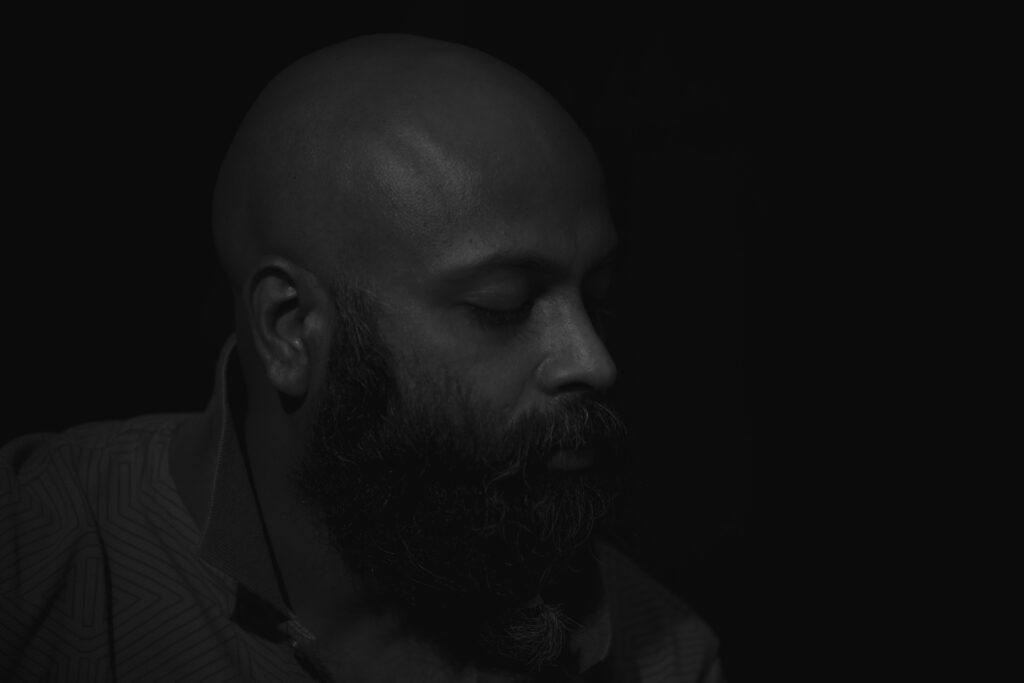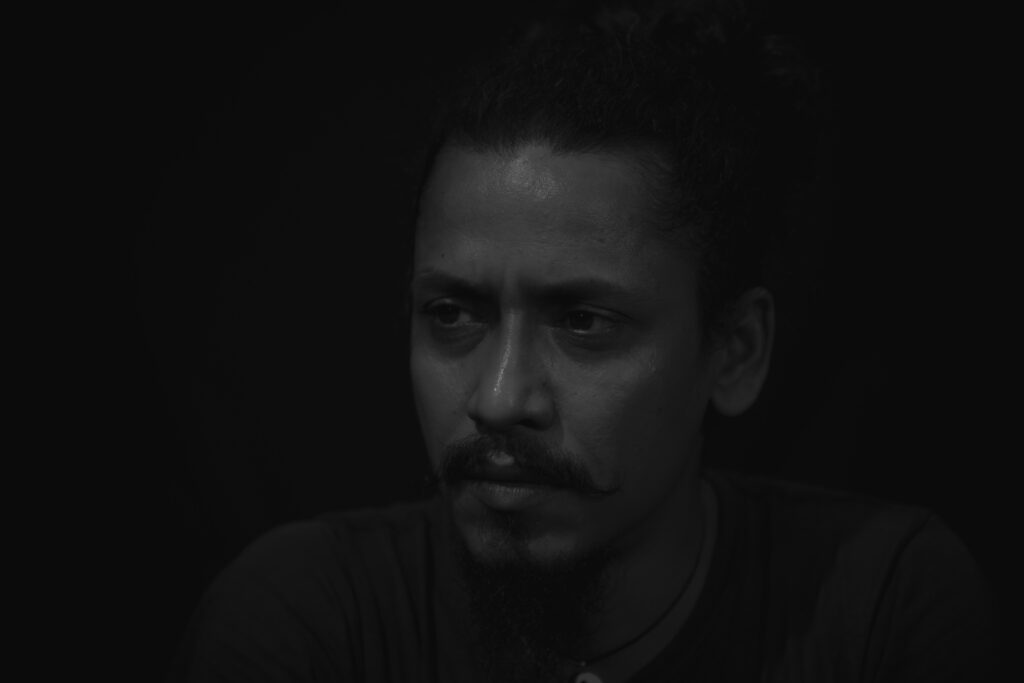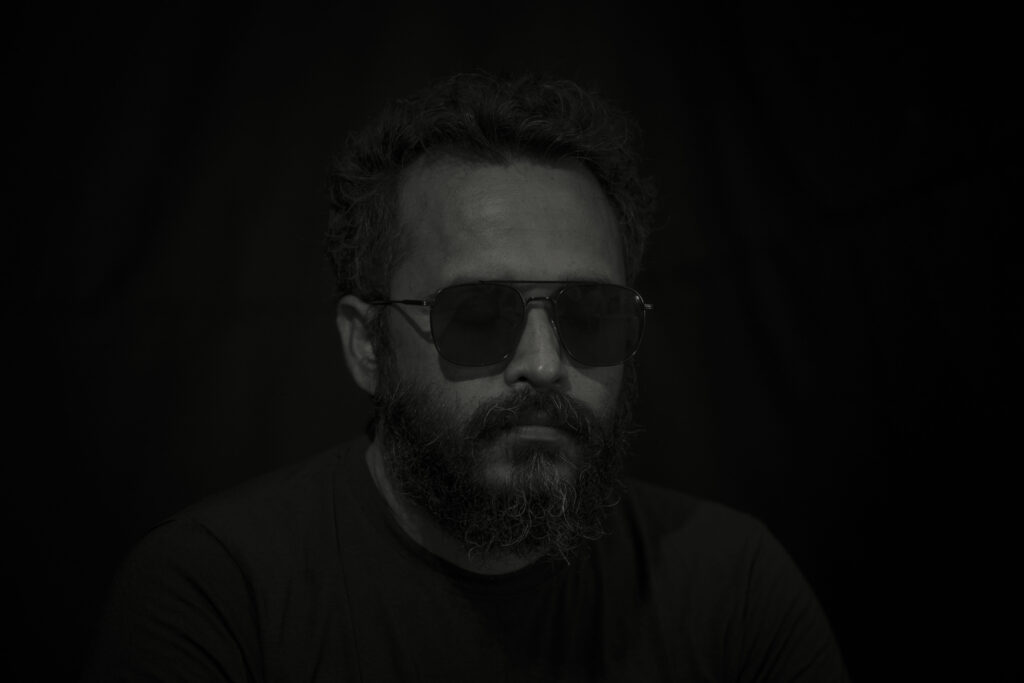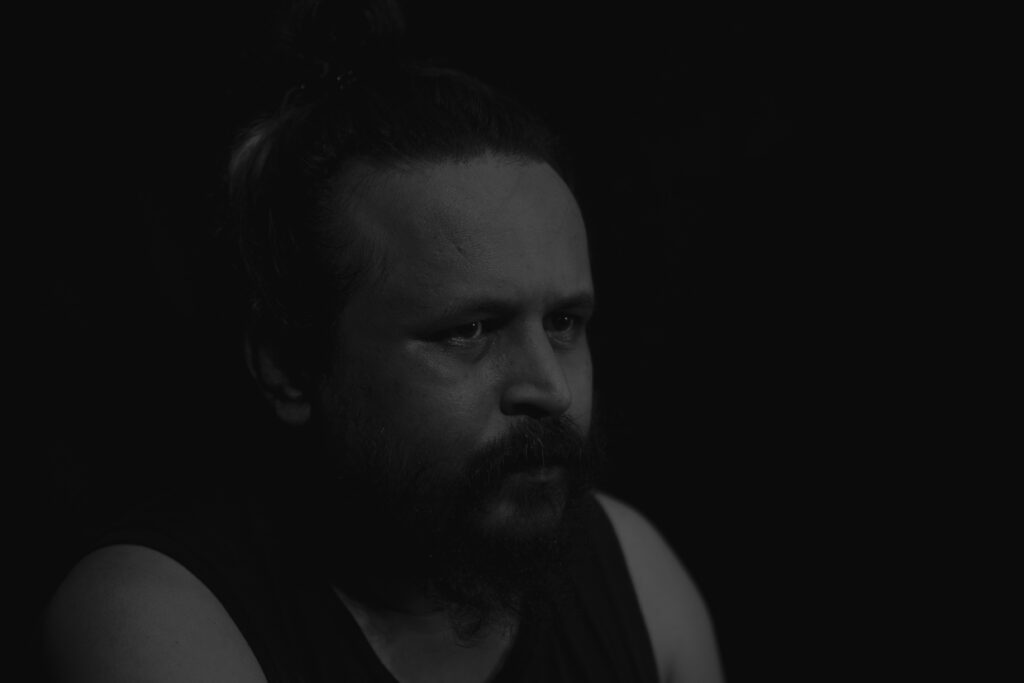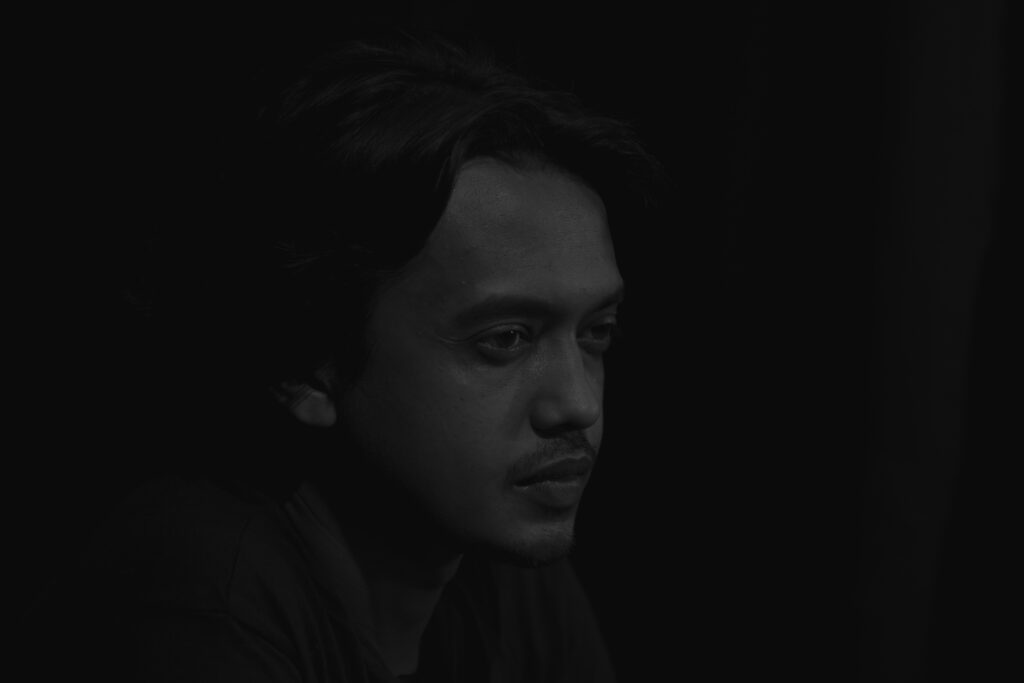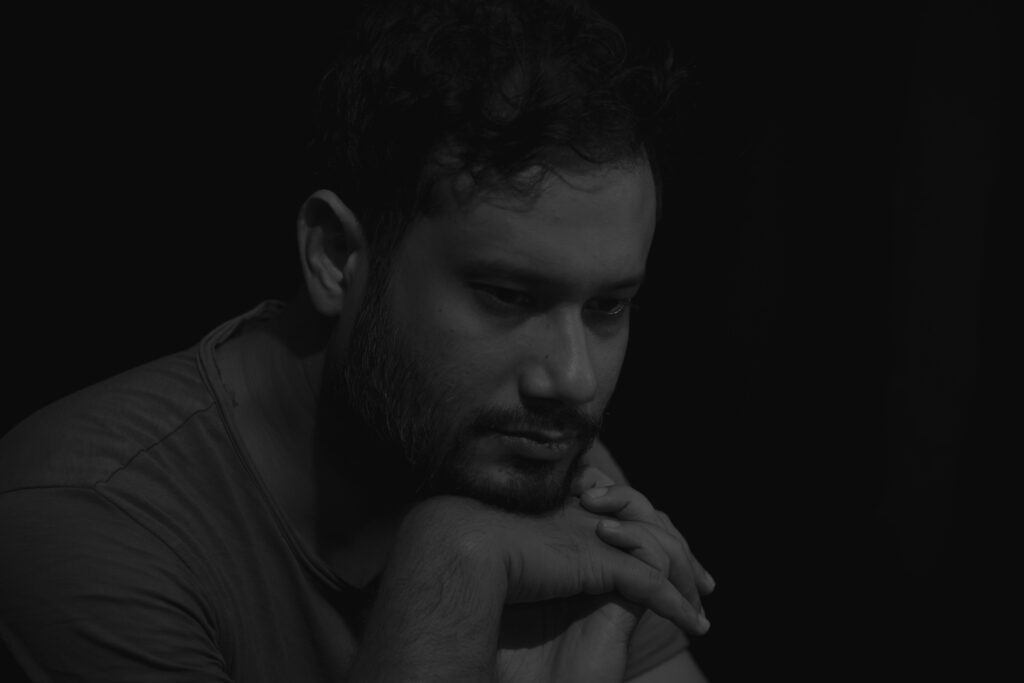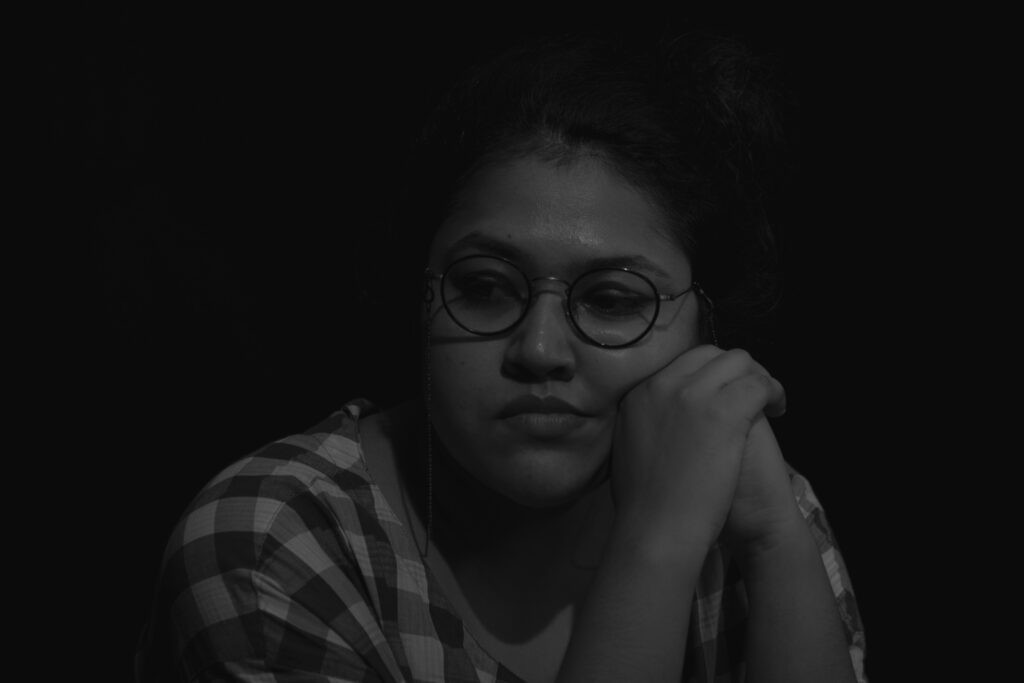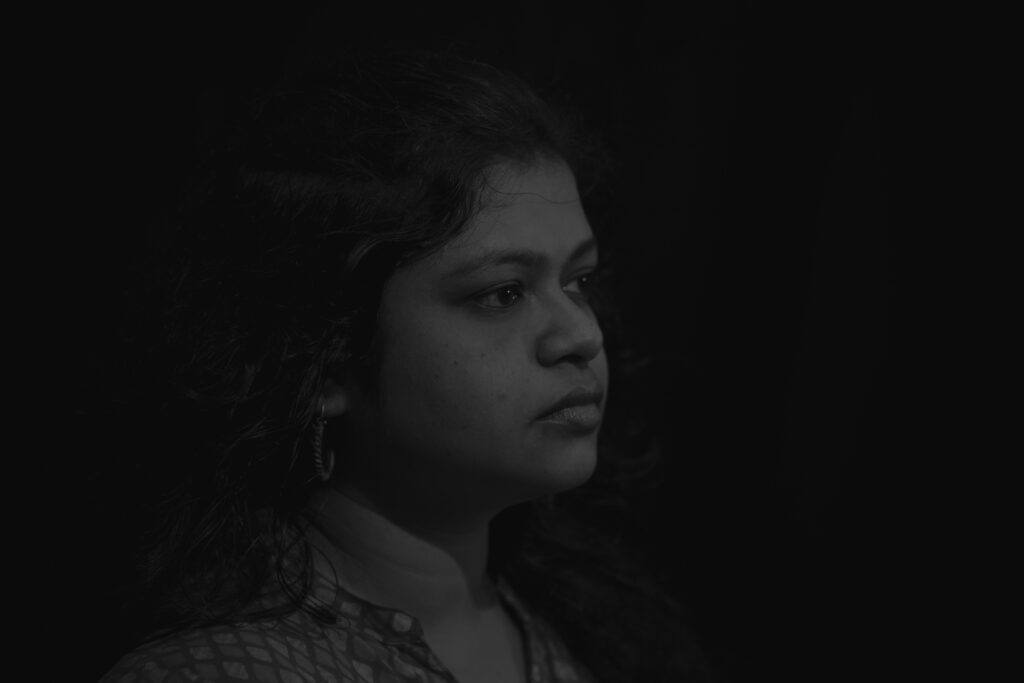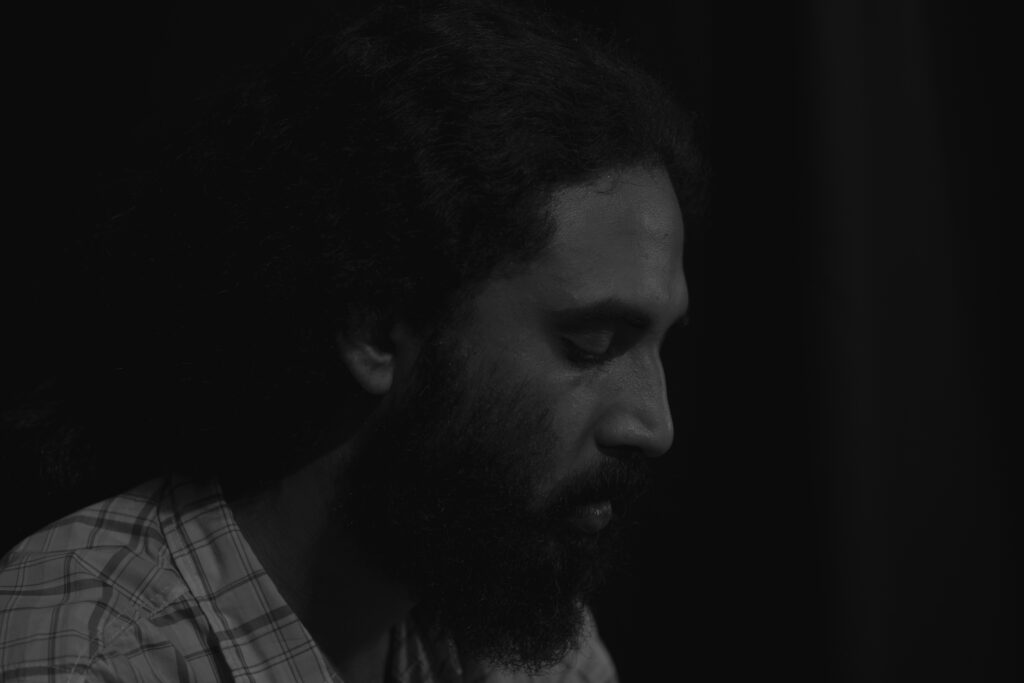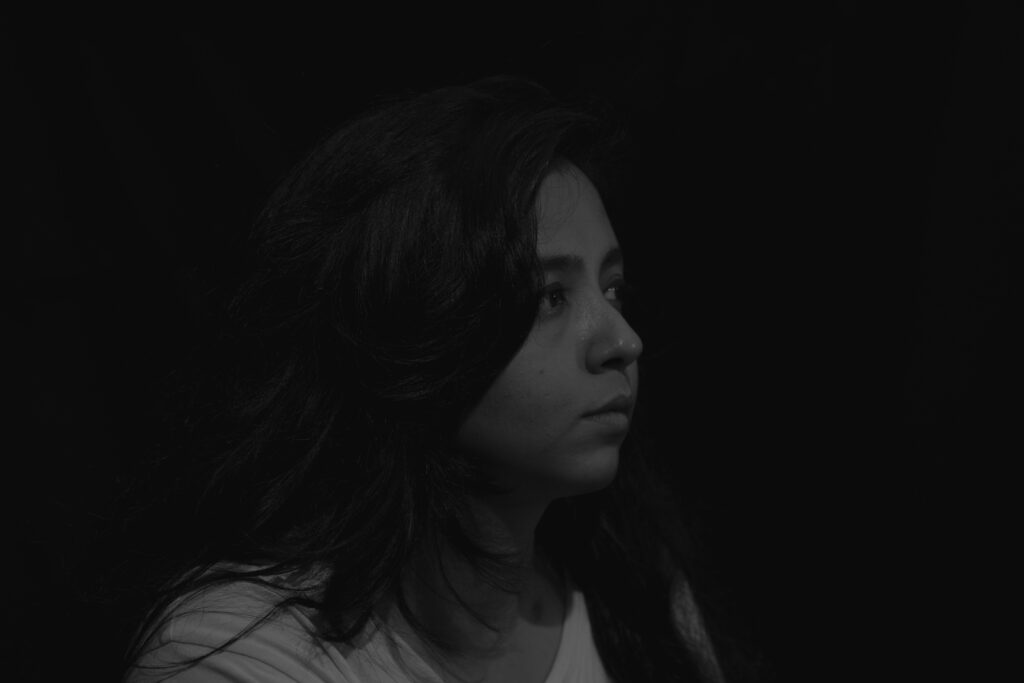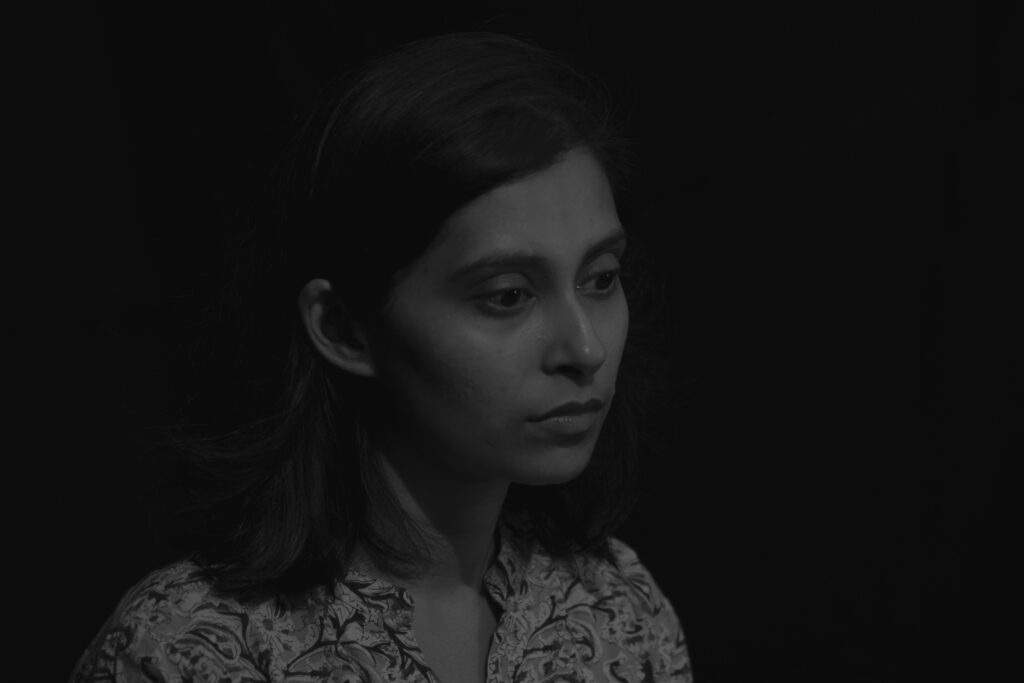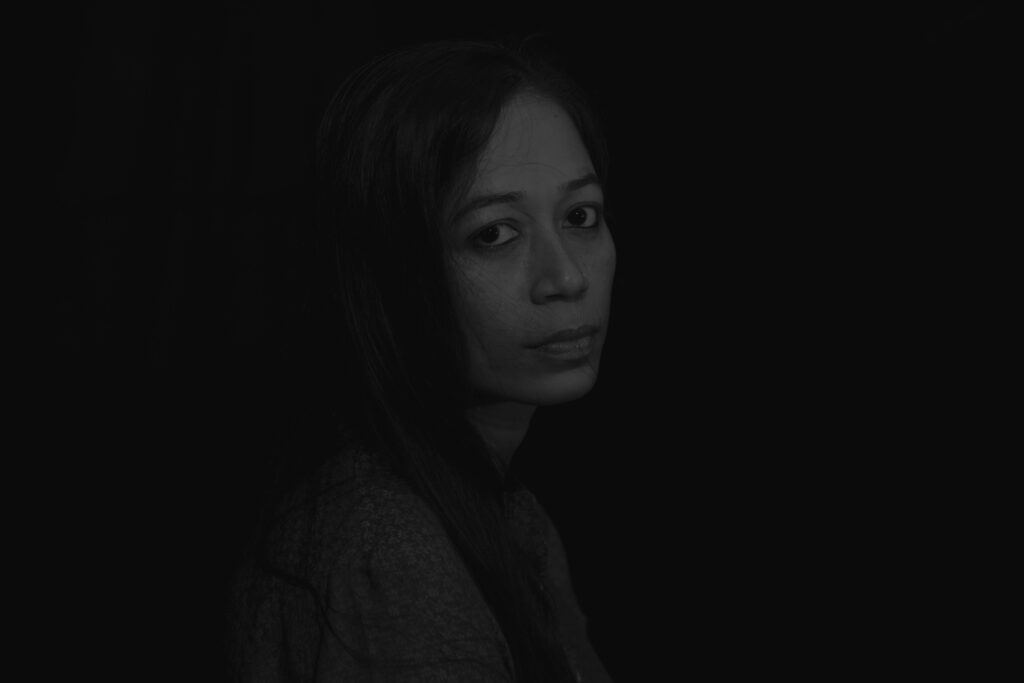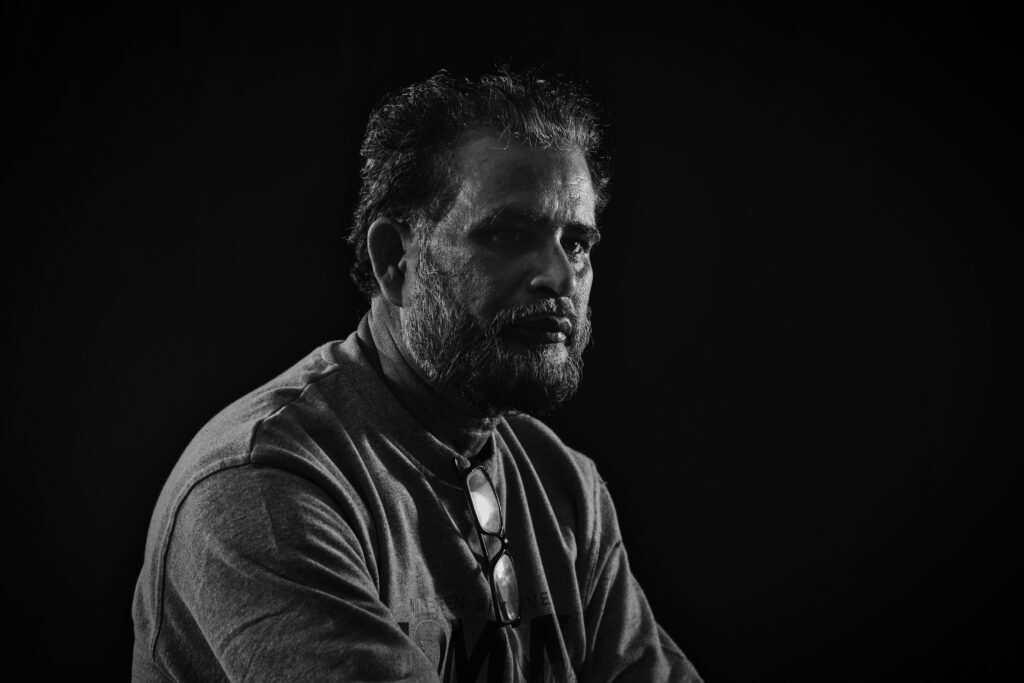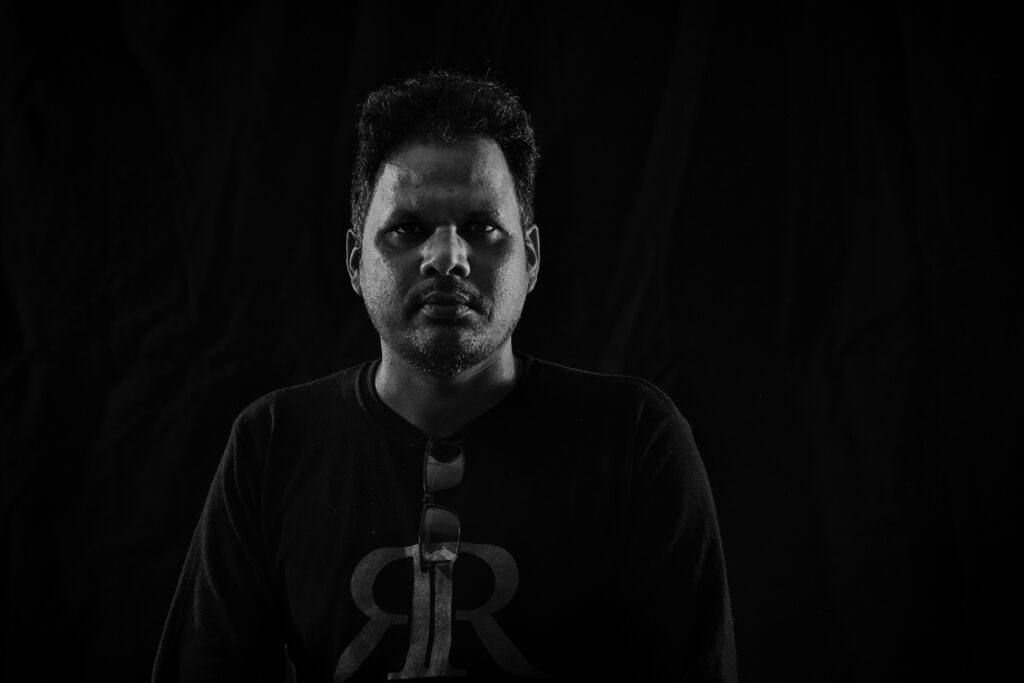CALCUTTA 71
Noted director Mrinal Sen’s CALCUTTA 71 was released in 1972. A collection of four stories representing the Naxal Movement in Bengal and the effects of the social, political, and financial crisis of the 1970s that eventually led to a lack of food and starvation in a chaotic, classified society.
All four stories in the film address the unsafe situation in society. A family is sent to a safe shelter in the middle of the night as the family lives in a slum area and is part of the lower class of society. Or the portrayal of young girls from a middle-class families who had to resort to prostitution as they could not handle the poverty and starvation. Another story portrays young people who had to give up their education and take up smuggling as their profession and started hating rich people. The fourth story shows an upper-class society that does not care about middle-class or lower-class people who struggle to survive in society. The elite does not want to justify their odd manners to others, although they are aware of their misbehavior. There are some other stories told in the film as well.
AAJ KAL PORSHUR GALPA & PALANKA
Written in 1963, Manik Bandyopadhayay’s famous novel ‘AAJ KAL PORSHUR GALPA’ is also known as ‘The Tale of Today, tomorrow and the Day After’. Nayendu Chatterjee directed this 1981 film. The famine of 1943 showcased female figures to a notable degree. A happily married couple from a small village broke up as the husband Ramapada abandoned his beloved wife Mukta. At the same time, she helplessly falls to protect herself and becomes a sex worker against her will. Although Mukta finally ends up going back home with her husband. The struggle against famine changes society’s views and reinforces the innocent villagers to speak out and stand up for Mukta against the greediest person in the village. Ramapada and Mukta finally overcome the pressure and start a new life. On the one hand, the writer wanted the rehabilitation of the oppressed humanity, and on the other hand, he also wanted the awakening of people against the successful greedy power. These two aspects are significantly highlighted in the story of Aaj Kal Porshur Galpa through the echoes of the world war and the famine.
Written by Narendranath Mitra and directed by Rajan Tarfder, the India–Bangladesh joint ventured film PALANKA – THE BEDSTEAD was released in 1975.
While the freedom from the dominant social system – ‘feudality’ becomes a challenge to someone’s life, threatening our social norms. An effect of the partition of the Indian subcontinent was strangely divided into the two countries, India and Pakistan, based on Hindu and Muslim religions in 1947 by the British.
When the upper-class Hindu jaminder (landlord) Rajmohan refuses to move to India and grows apart from his family yet provides financial support to the rest who have already migrated to India, at some point, he is forced to sell his favorite thing, the pride of the house – a vast ornamental wooden bed – to his poor servant Maqbool. Right after the sale, the class question becomes the village talk, and Rajmohan regrets his mistake and wants the bed back. Despite having no food or help, abandoned Maqbool intends to keep this luxurious item in his home at any cost. The denial of poor Maqbool drives the family to starvation and eventually close to death. But finally, the story twists to a satisfactory ending, though the uncompromising Maqbool reveals his upheaval against the powerful classicist society and does not bow down against his will.
ASANI SANGKET
ASANI SANGKET-DISTANT THUNDER is a 1973 film by the highly acclaimed Indian director Satyajit Ray. The film is based on a unique novel by Bibhutibhushan Bandapadhyay.
The film was set in 1943-44. World War II caused a massive manmade famine in Bengal during British rule. The film analyzes the human scale of the devastating event that wiped out more than three million people. In a beautiful, peaceful traditional village, changes in life due to the pressure of hunger and starvation gradually become apparent.
As food runs out, Gangacharan, a rural teacher from the upper cast, seeks to preserve his privileged lifestyle. His wife Ananga does what is best for her community in the newly built society with the unrest that the villagers were unfamiliar with. They are unaware of the war on the other side of the world, but suddenly are victimized by the effects of the war.
TITAS EKTI NADIR NAAM
The melodramatic tale TITAS EKTI NADIR NAAM (1973) – A RIVER CALLS TITAS: The film was jointly produced by India and Bangladesh and directed by the illustrious director Ritwik Ghatak. The movie is based on a novel by Adwaita Mallabarman, first published in 1956. The author himself belonged to a fisherman society.
The story not only depicts the life of a fisherman from the banks of the Titas River in Brahmanbaria, Bangladesh, but also explores partition, starvation, anguish, love, beliefs, hope, and other themes. What happened to the Bengalis as a result of the so-called partition of Bengal into British India and Pakistan in 1947 is the core idea of the story of this film.
It is a story about a shy young girl whose family arranged for her to marry a stranger without notice. After spending a night together in the dark, the next day, she follows her husband-to-be and takes a boat journey but is suddenly kidnapped on the river. The man becomes mentally ill due to the kidnapping, not knowing that his young bride fought the bandits and escaped. Ten years later, knowing only the name of her husband lives in, the girl embarks on a journey to look for him and heads with her young son to the village. Due to the threat of starvation, she is refused by the villagers but sheltered by a strong young widow who finally becomes the central point of this film.
GOLAPI EKHON TRAINE & MACHHER JHOL
“GOLAPI EKHON TRAINE” (GOLAPI IS NOW ON A TRAIN, 1978): A novel by Amjad Hossain, originally called Doupodi Ekhon Traine, finally turned into a dramatic film directed by Amjad Hossain himself.
The struggle of a poor folk musician’s family against the influential people of the society, depicted in various ways in the film via a love story between two people of different classes, is a familiar story in Bangladesh. Right after the liberation war between Bangladesh and Pakistan in 1971, most ordinary people in this new country had a hard time feeding their families every day. Although there were so many other crises, food became a vital issue, and several people starved to death. A beautiful young girl goes through deep mourning when her father commits suicide because of her dowry and the unsuccessful wedding ceremony with an unknown stranger. The family has no man to support it, so the girl has to leave her comfort zone, go into business, and go through an endless trail by train. She becomes the family’s sole support, and the influential in society view the job negatively and taunt her every day.
Meanwhile, her ex-boyfriend from the wealthiest family is treated like a mentally ill person, becomes part of a village conspiracy, and is eventually poisoned to death. Golapi has no option but to go on an unknown journey by train to survive. The pink-faced shy girl suddenly becomes a rough-tanned woman who is not afraid to fight against society.
MACHHER JHOL (2017) – THE FISH CURRYProduced by Sony Pictures and directed by Pratim D. Gupta. Maacher Jhol is the first Bengali food-based film.
The Paris-based celebrity chef Dev returns to Kolkata, India, after 13 years when his mother falls ill. Dev quits his job due to his passion for becoming a chef in Paris, leaving behind his newly married wife and his parents. He must confront his past, his parents, his wife, his unknown biological son, and his very own maacher jhol that he cooked in his teens.
The film is an uplifting story about a renowned master chef rooted in food culture through a bowl of fish curry, a Bengali delicacy. Dev’s ill mother makes him cook maacher Jhol using various recipes with a dissatisfactory gesture, while Dev has to scour his memory to figure out the recipe his mother has remembered for all these years.
Working process of the mural at Studio Mahbub Lipi, Dhaka
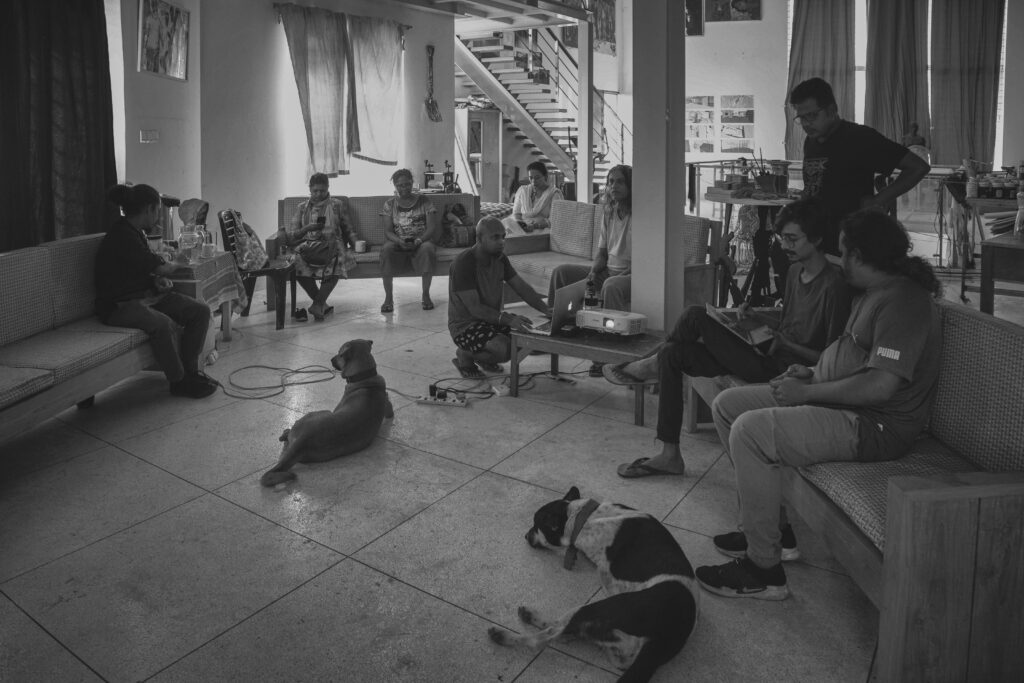
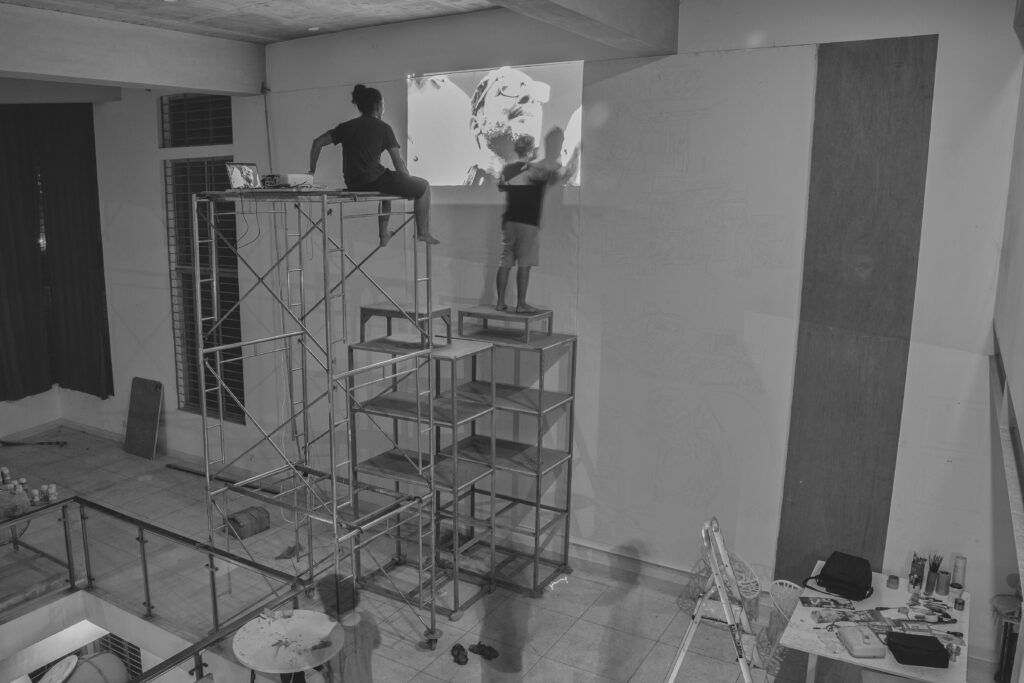
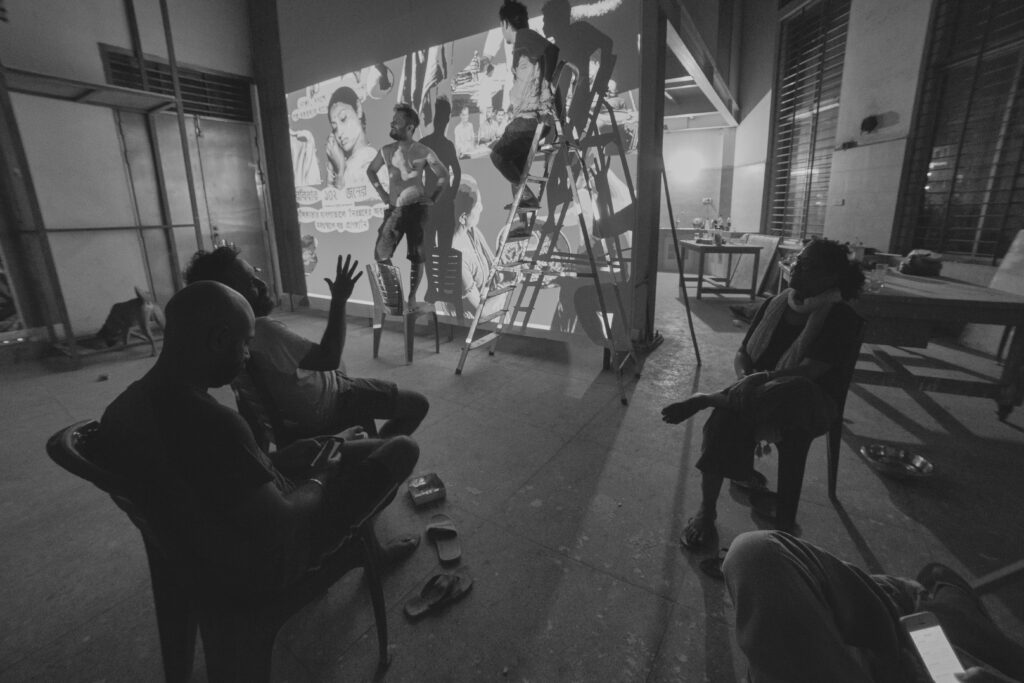
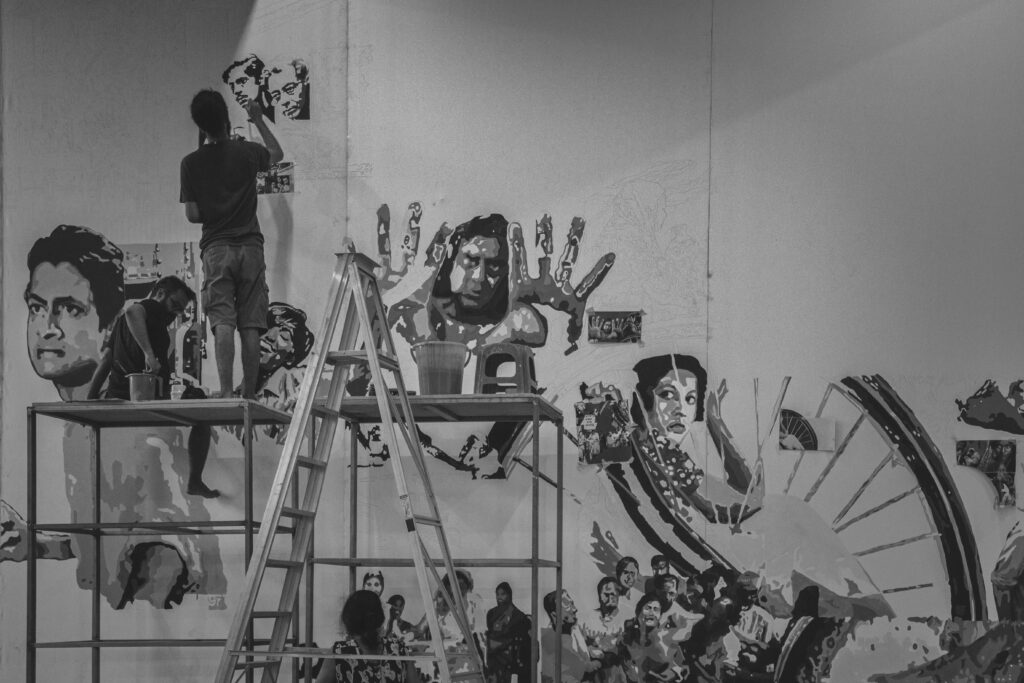
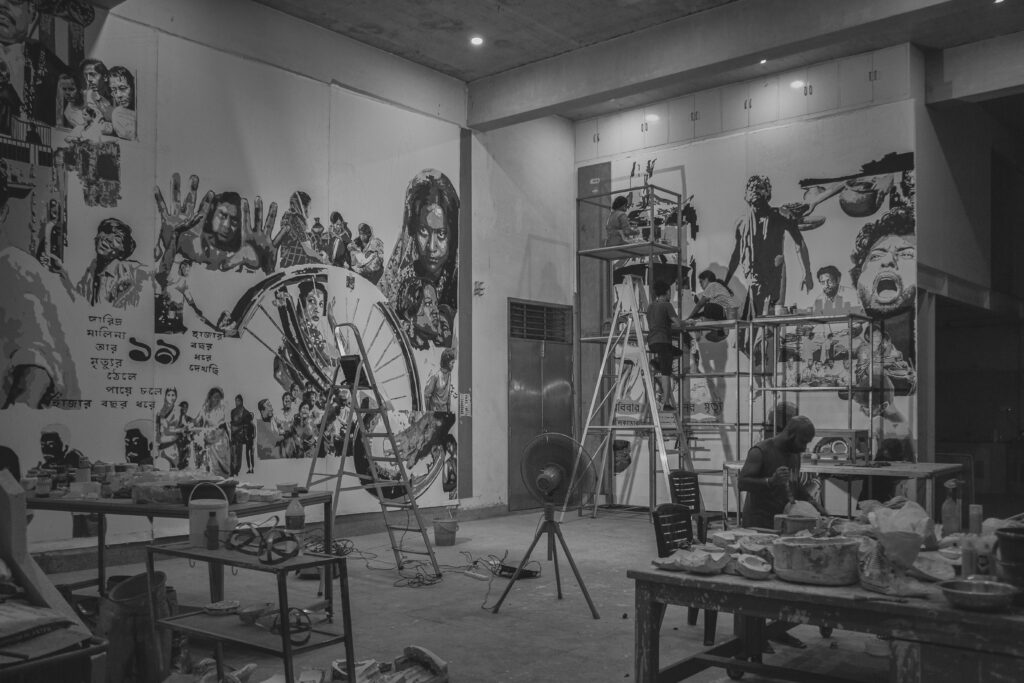
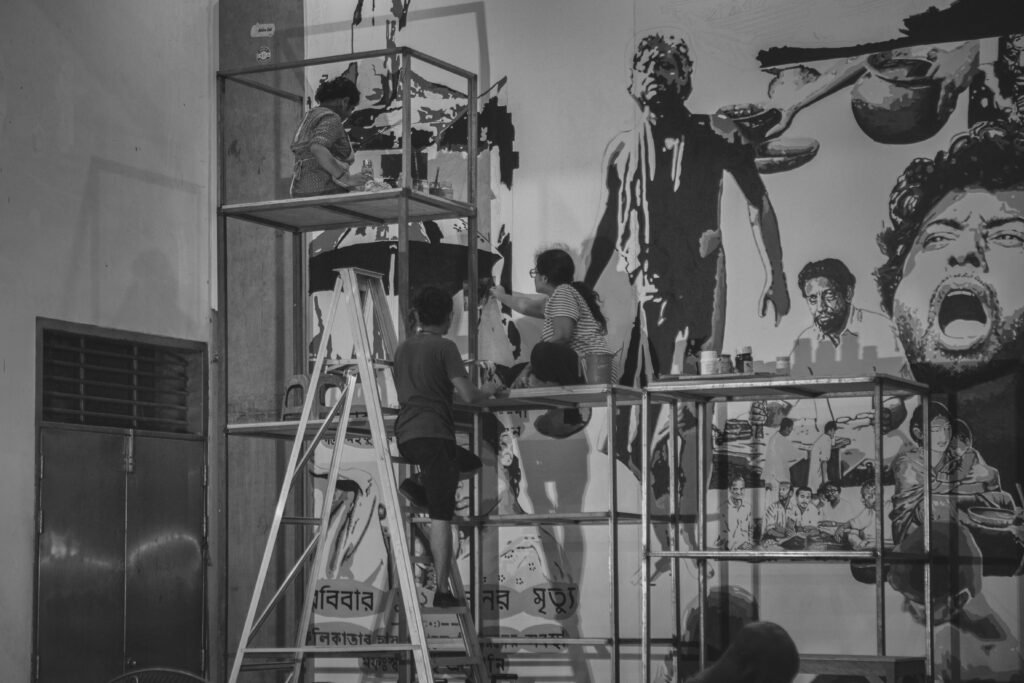
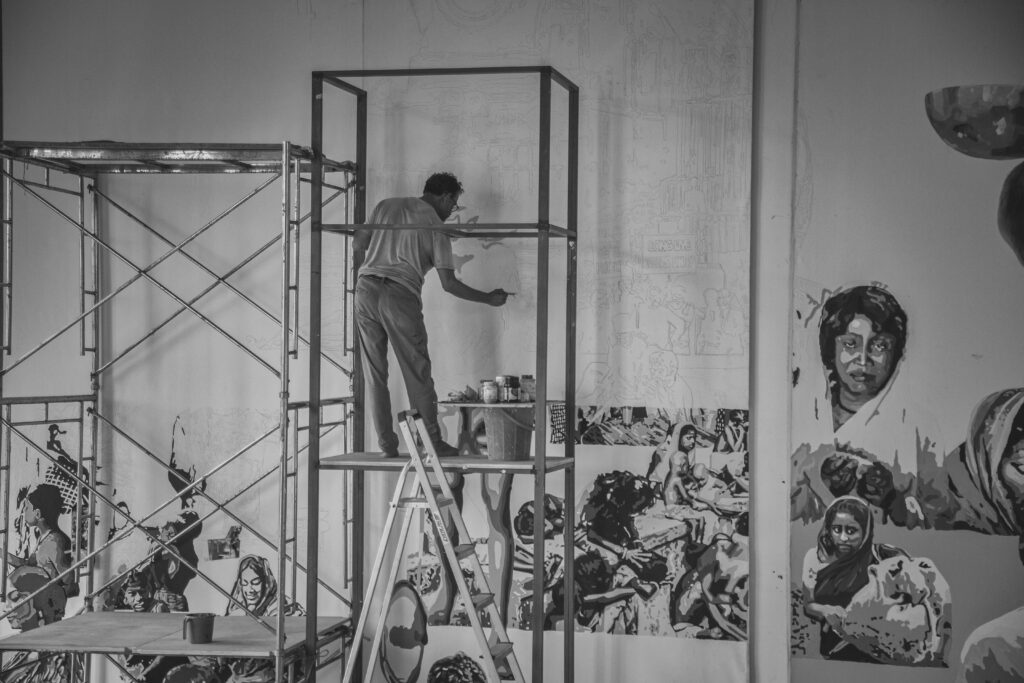
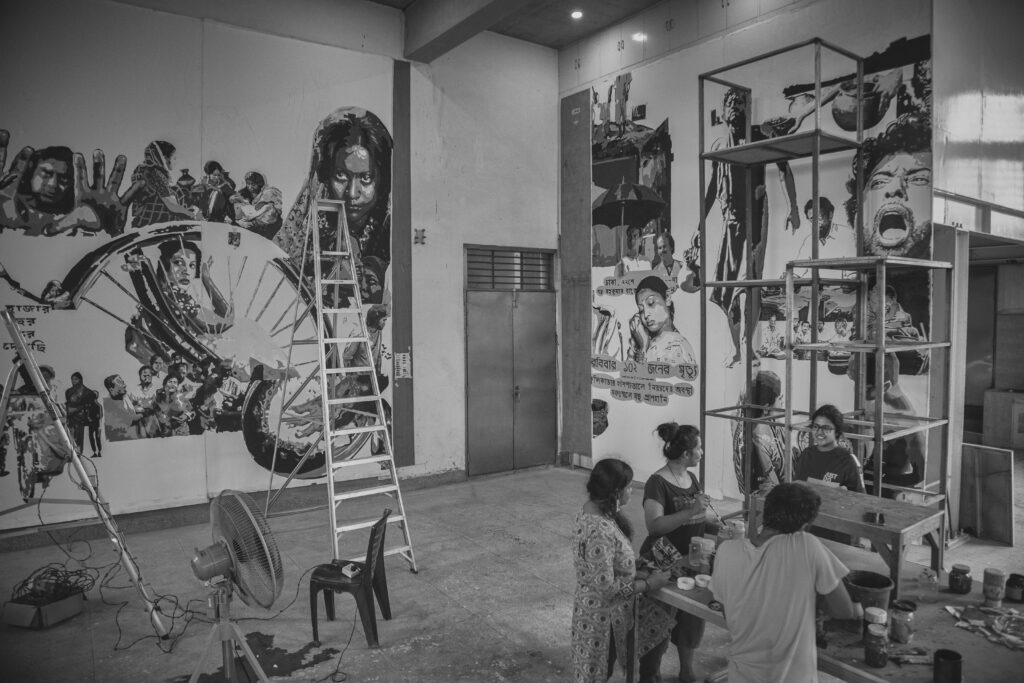
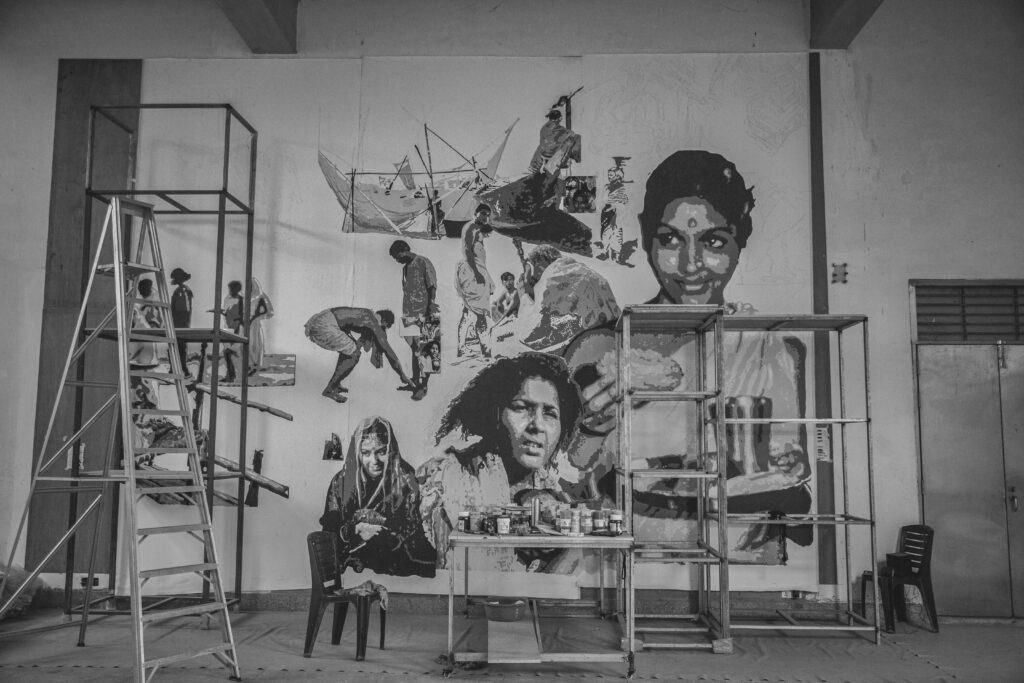
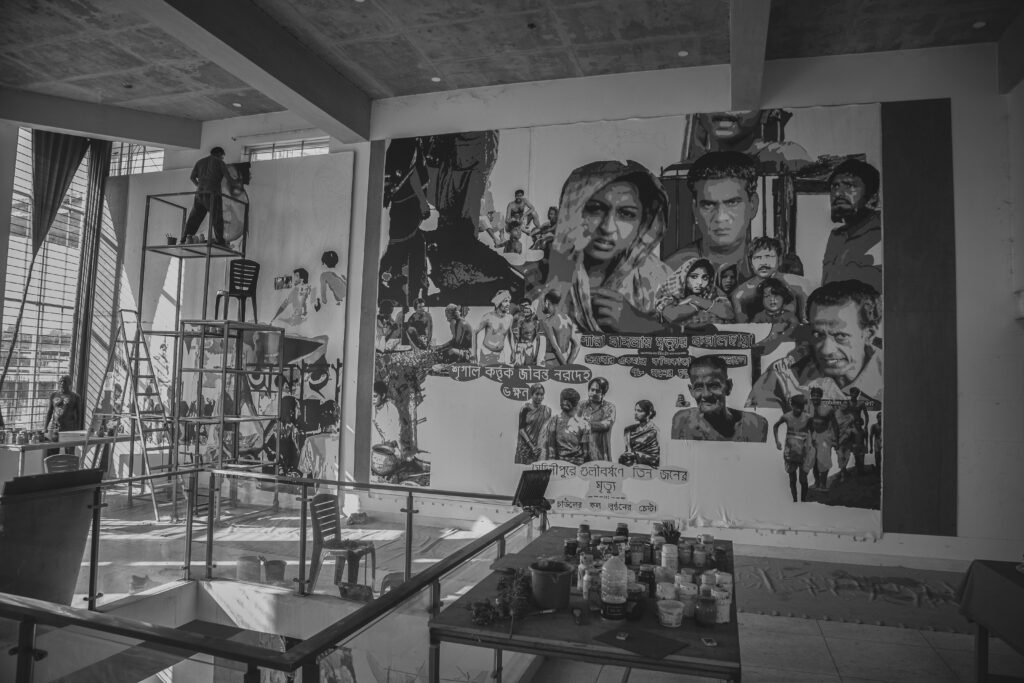
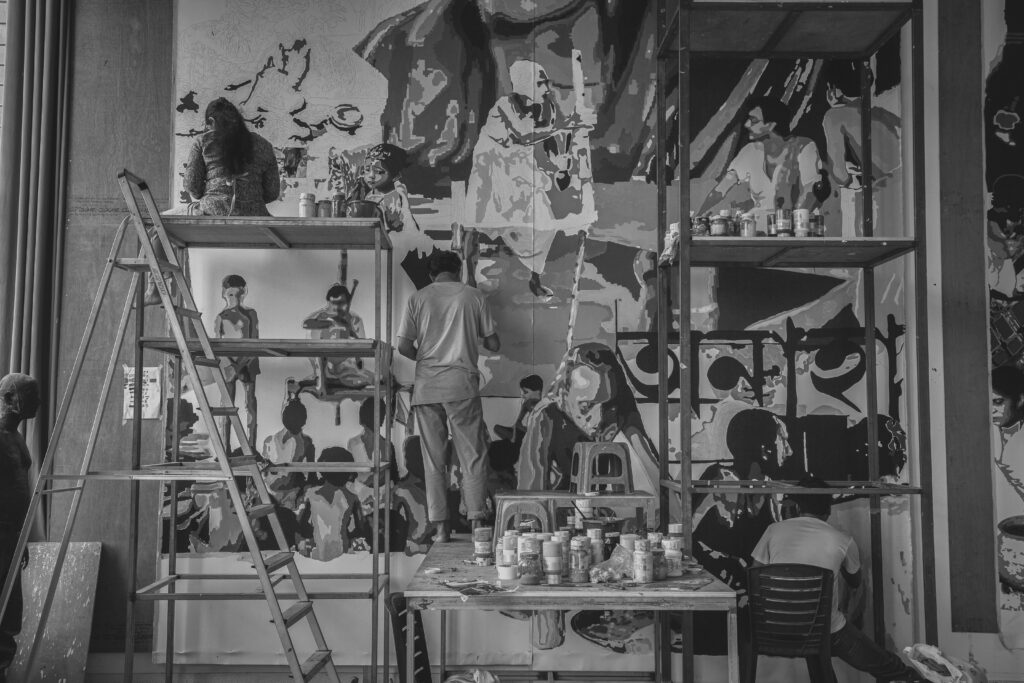
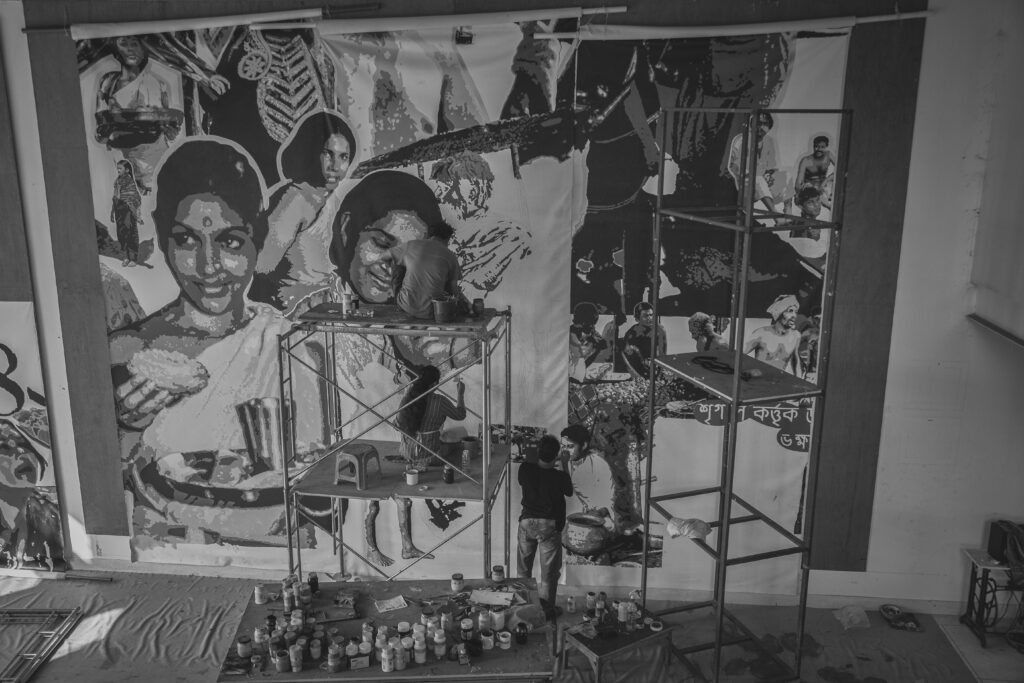
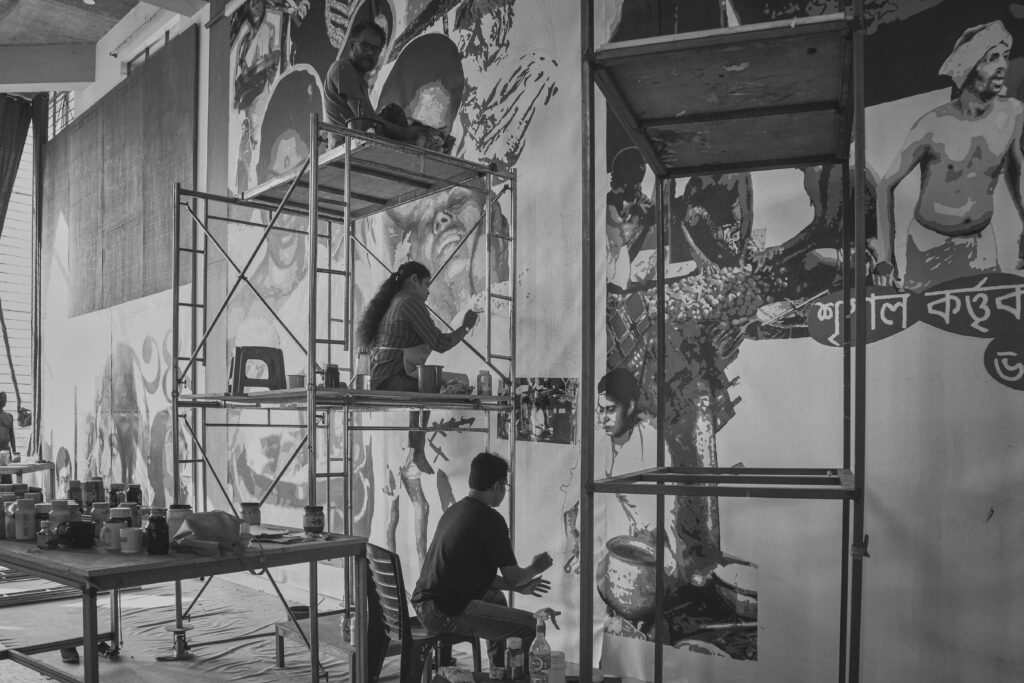
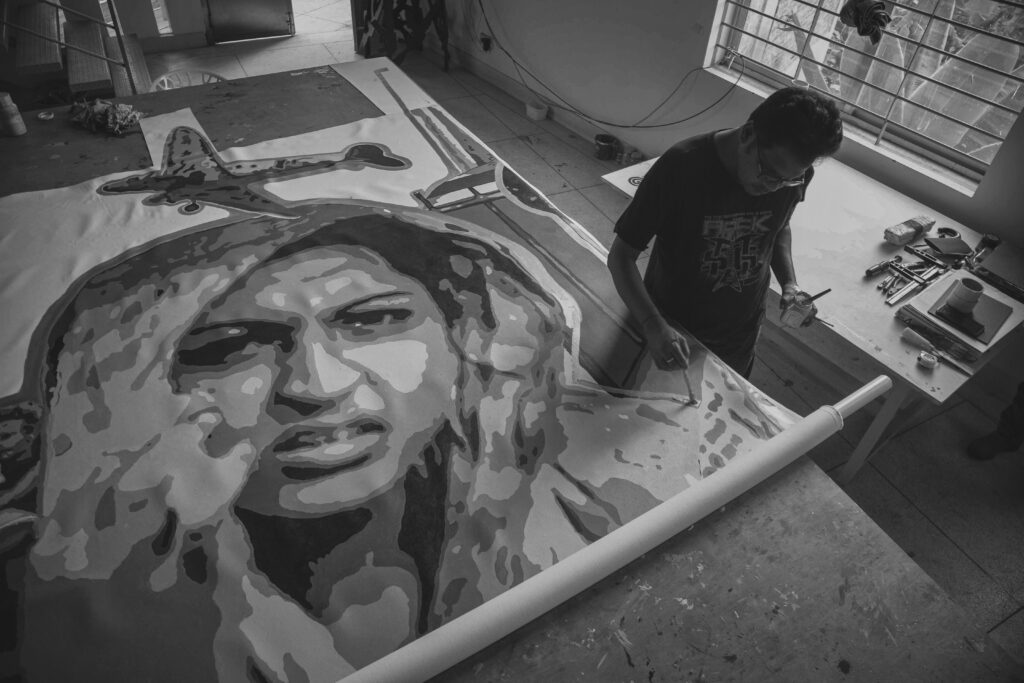
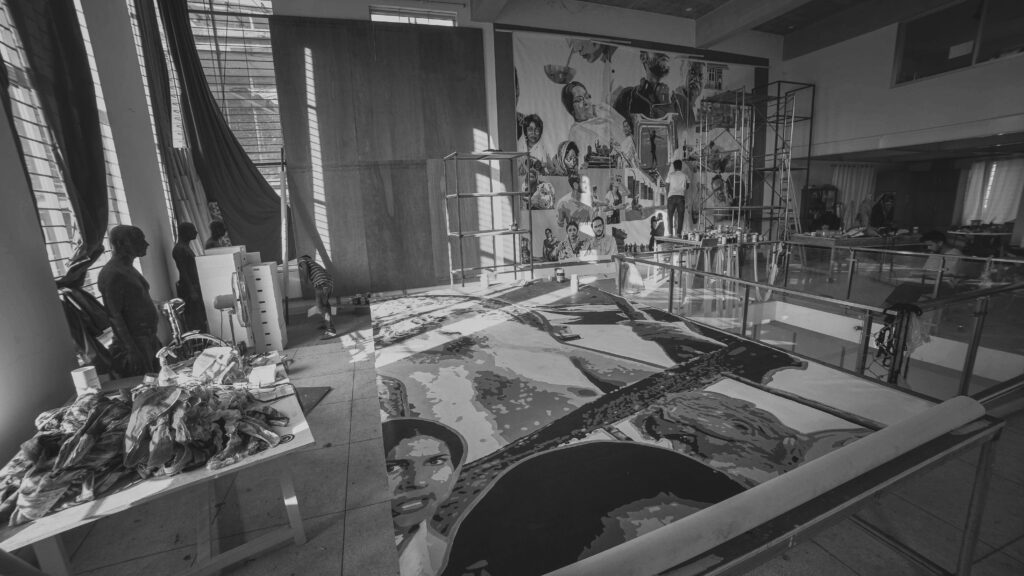
Working process of the mural at Documenta-Halle, Kassel
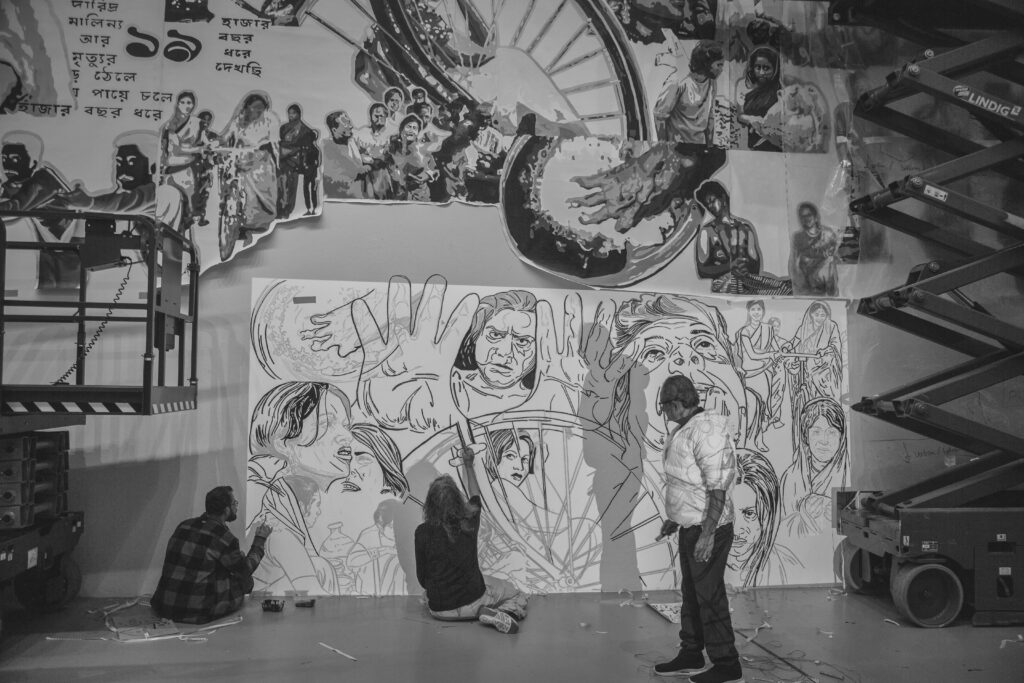
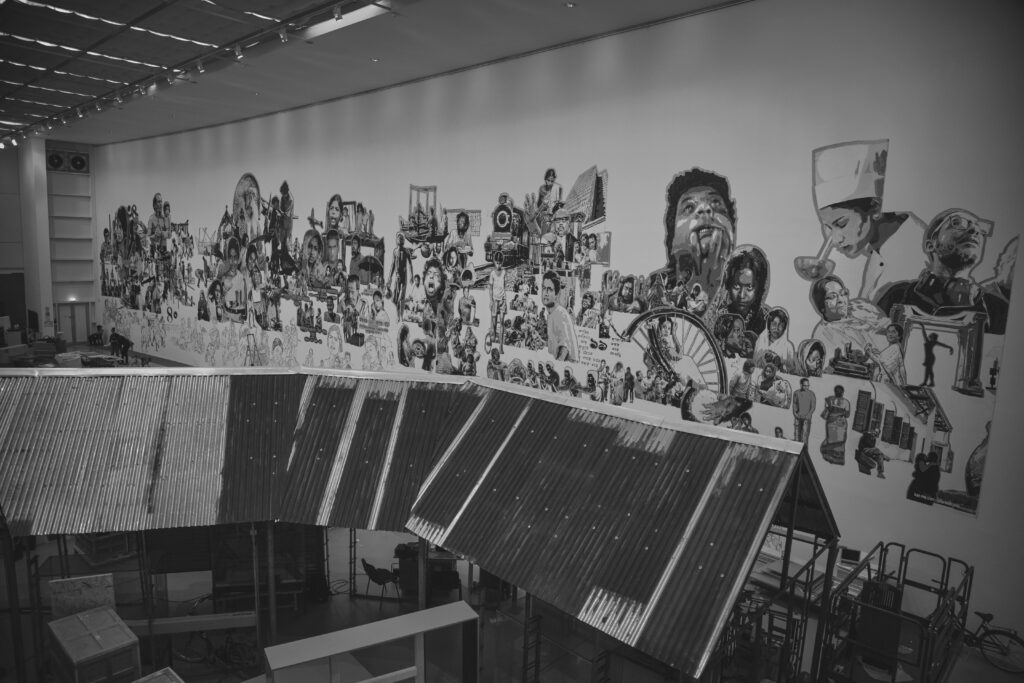
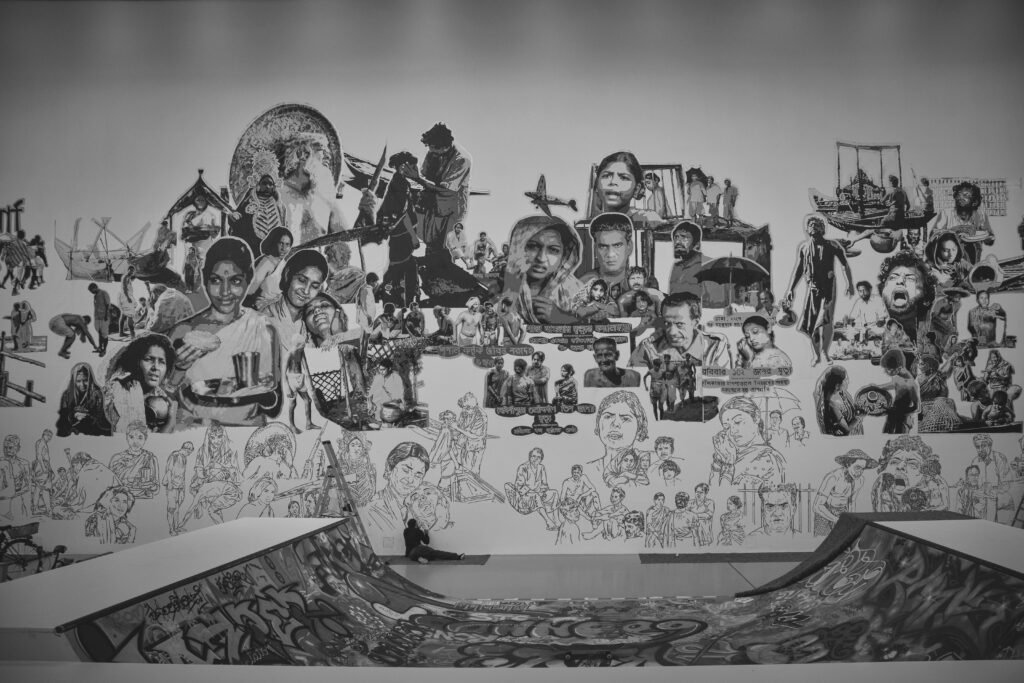
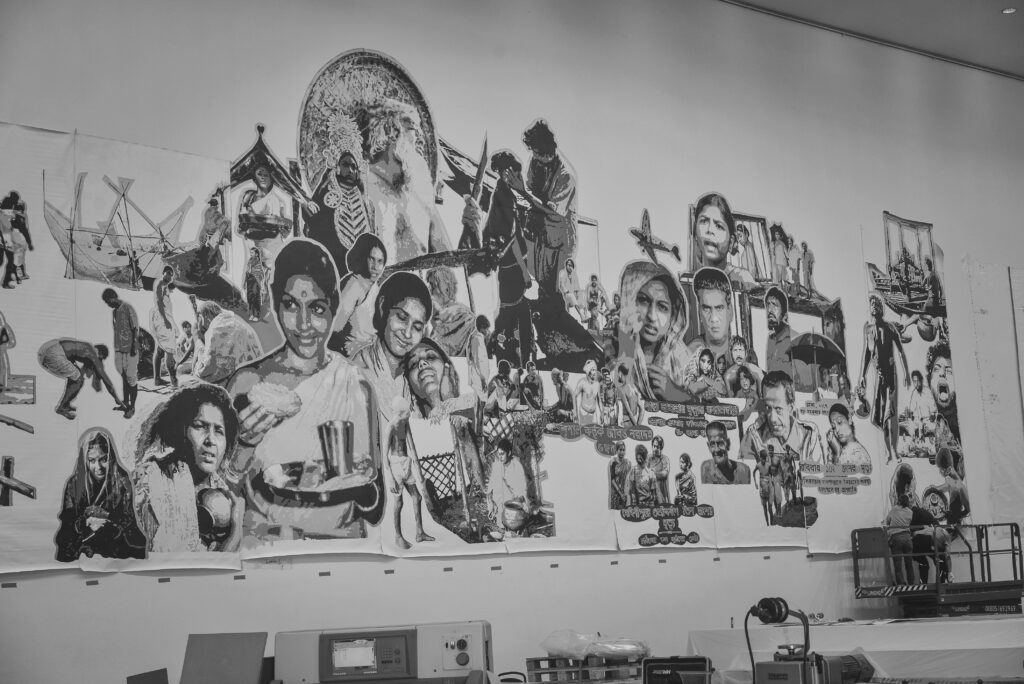
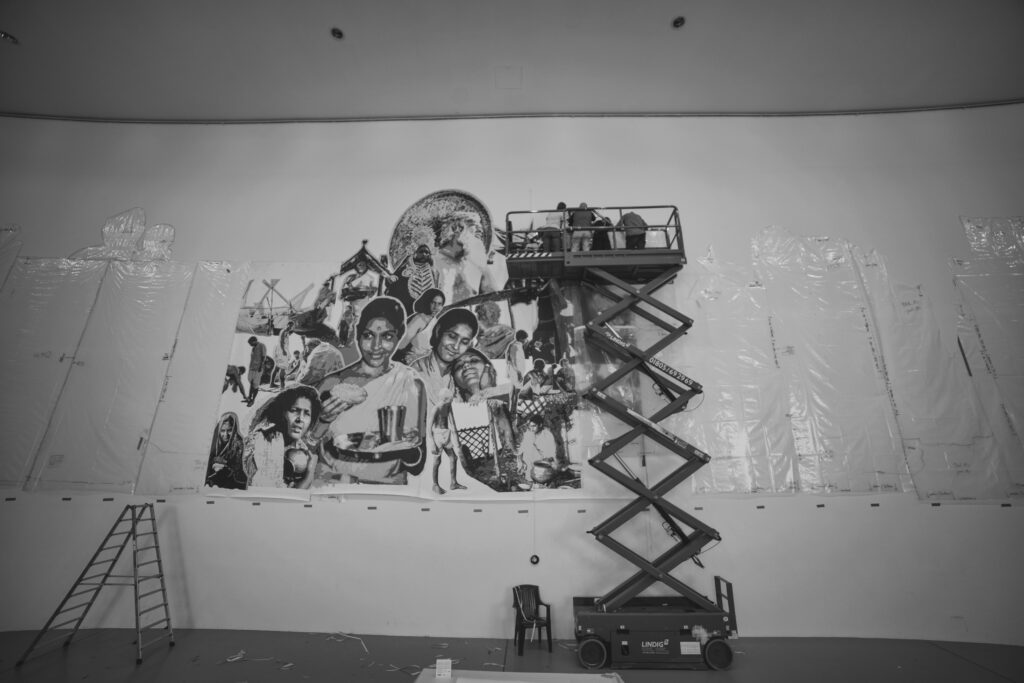
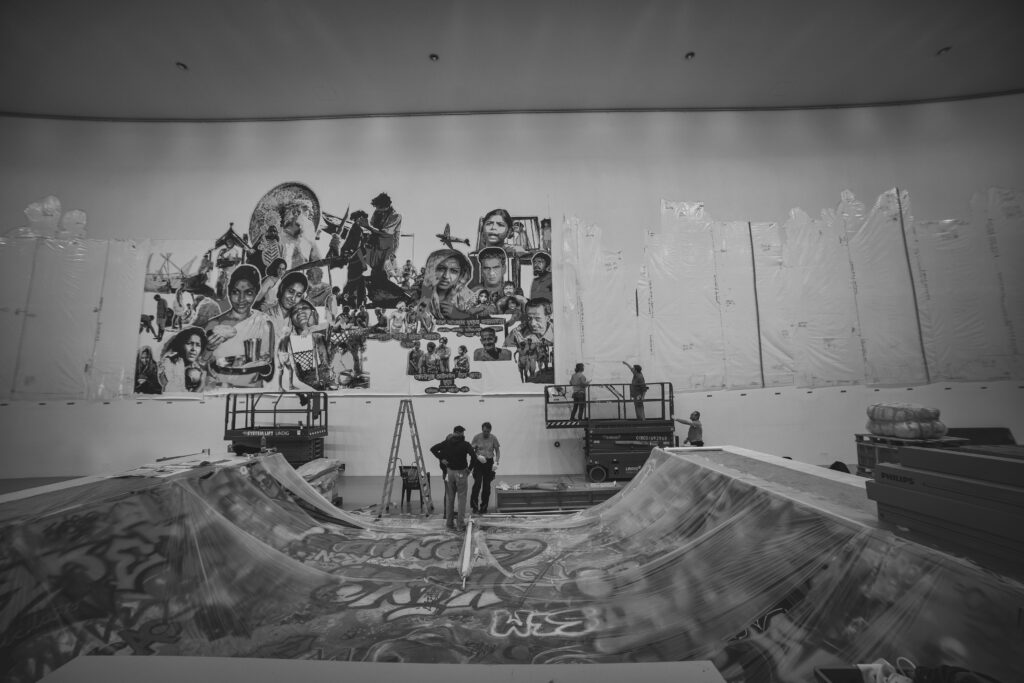
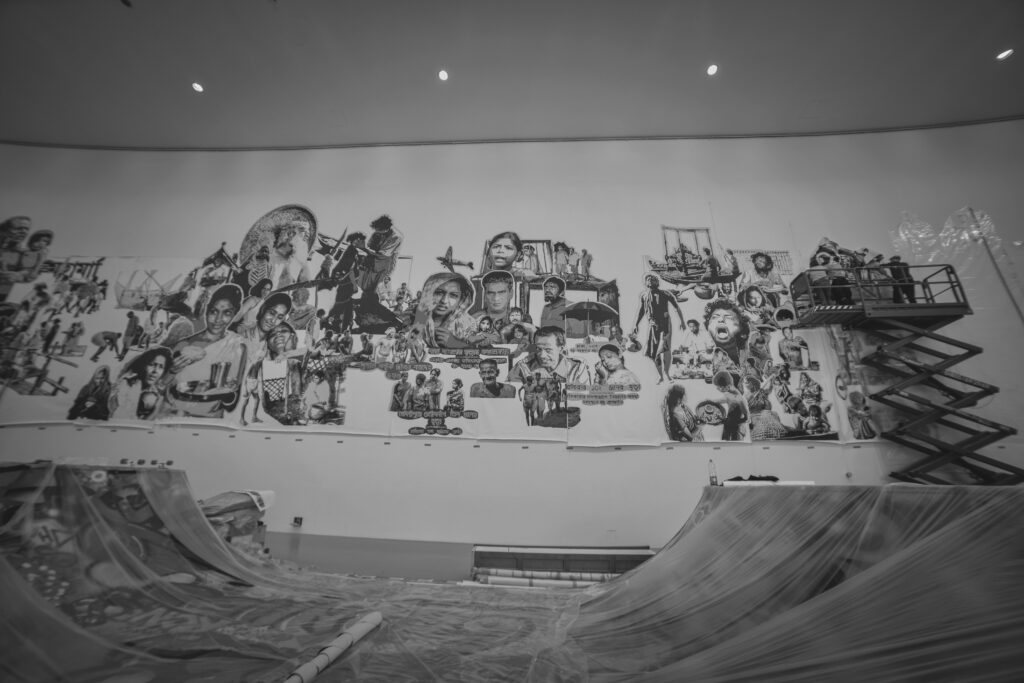
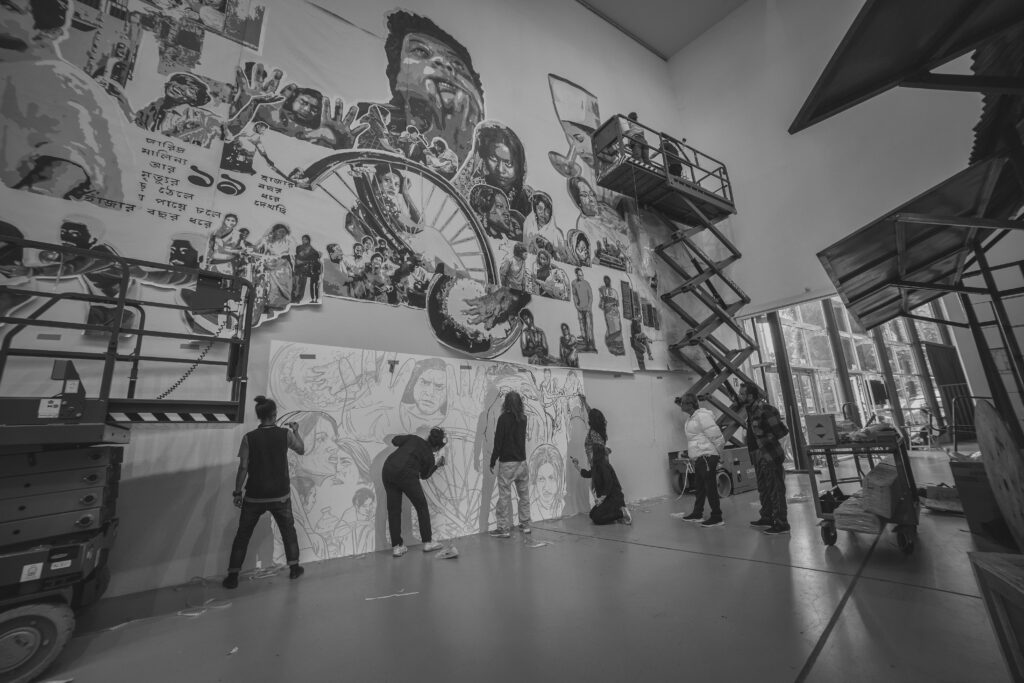
Photo collage of the painting

Working Process at Studio Mahbub Lipi, Dhaka
Artist Team
Abdur Rab, Jewel A Rob, Arpita Singha Lopa, Azizee Fawmi Khan, Jinnatun Jannat, Mahbubur Rahman, Mahbubur Rahman, Mehedi Hasan, Emran Sohel, Rakib Anwar, Sarah Jabin, Sayed Fida Hossain, Shimul Saha, Shree Tapan Chandra, Tayeba Begum Lipi, Yasmin Jahan
